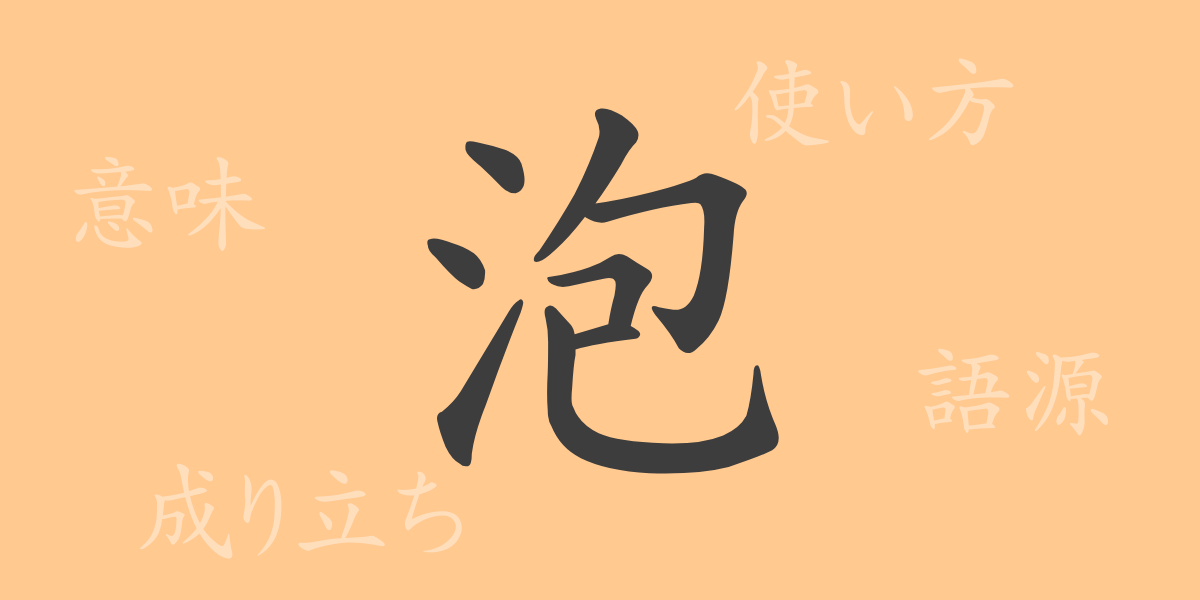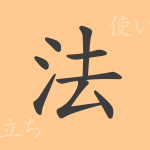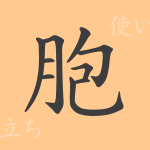The moment when the surface of the water bursts, countless small spheres are born along with the air; these are “bubbles” (あわ, awa). Bubbles are seamlessly integrated into our daily lives, always present around us. In this article, we focus on the common Japanese kanji “泡” (あわ, awa), delving into its origin, meaning, usage, pronunciation, and even exploring idioms and proverbs that use bubbles. Let’s embark on a journey into the world of bubbles together.
The Origin of 泡 (あわ, awa)
The kanji “泡” (あわ, awa) is composed of “氵” (さんずい, sanzui), which represents water in motion, and “包” (ほう, hou), symbolizing the act of blowing bubbles. In ancient China, this kanji was used to depict the mixing of water and air to create bubbles. This character embodies both the strength of water and the fleeting brilliance of bubbles.
The Meaning and Usage of 泡 (あわ, awa)
The kanji “泡” (あわ, awa) refers to small spheres of air trapped in liquid. Broadly, it encompasses all bubble-like substances, such as soapy lather or beer foam. It is often used in expressions like “泡を吹く” (あわをふく, awa wo fuku – blow bubbles), “泡立つ” (あわだつ, awa datsu – foam up), and “泡が消える” (あわがきえる, awa ga kieru – bubbles disappear).
Reading, Stroke Count, and Radical of 泡 (あわ, awa)
Let’s unravel the basic information about the kanji “泡” (あわ, awa).
- Reading: In On’yomi (音読み), it is read as “ホウ” (ほう, hou), and in Kun’yomi (訓読み), it is read as “あわ” (あわ, awa).
- Stroke Count: It consists of 8 strokes in total.
- Radical: The radical is “さんずい” (さんずい, sanzui), which is common in kanji related to water.
Idioms, Proverbs, and Expressions Using 泡 (あわ, awa)
In Japanese, there are various idioms, proverbs, and expressions that include “泡” (あわ, awa). Let’s explore their meanings.
- 泡沫 (うたかた, utakata): This refers to the transient and fleeting nature of things in this world. Often used in the phrase “泡沫の夢” (うたかたのゆめ, utakata no yume), meaning a temporary and ephemeral dream or hope.
- 泡を吹く (あわをふく, awa wo fuku): To blow bubbles from the mouth due to sudden loss of consciousness or intense pain. It can also mean to suffer a great loss.
- 泡吹雪 (あわふぶき, awa fubuki): A term likening scattered bubbles to snowflakes, particularly referring to white waves seen at the seaside.
Summary of 泡 (あわ, awa)
The kanji “泡” (あわ, awa) encapsulates the transient brilliance and ephemerality from its formation to disappearance. We have seen that “泡” (あわ, awa) appears in various aspects of life and carries deep meanings in the Japanese language. Next time you hold a glass of frothy beer, it might be interesting to ponder the background of this kanji.

























